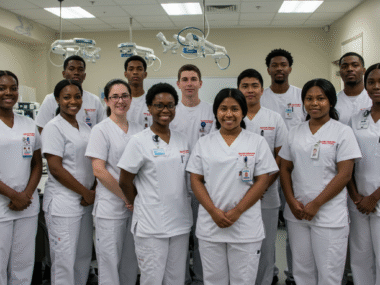Picture this: the alarm buzzes, your heart races a bit, and suddenly it’s exam day—the moment you’ve been gearing up for, where all that hard work either shines or stumbles under pressure.
Exams can feel like a high-stakes game, but staying calm and focused isn’t about luck; it’s about smart strategies that anyone can use. Whether you’re a high school student cramming for finals, a college undergrad tackling midterms, or even a professional facing certification tests, these tips will help you navigate the day with confidence. I’ve pulled together practical advice from my own experiences and what I’ve seen work for friends and family over the years. The goal? To turn that nervous energy into sharp, productive focus. Let’s dive in and break it down step by step, so you can walk into that exam room feeling ready to conquer.
Preparing the Night Before: Setting the Stage for Success
The real magic of exam day starts the evening prior. Think of it as laying the foundation for a sturdy house—if it’s shaky, everything else might wobble. One of the best ways to ensure you wake up calm is to organize your materials ahead of time. Grab your backpack and double-check: pencils, pens, erasers, calculator if needed, ID card, and any permitted notes or books. I remember once forgetting my student ID during a big test, and the scramble at the door added unnecessary stress. Avoid that by making a checklist the night before.
Sleep is another non-negotiable. Aim for at least seven to eight hours—your brain consolidates memories while you rest, making recall easier the next day. Skip the all-nighter; studies show it impairs cognitive function more than it helps. Instead, wind down with a relaxing routine. Maybe read a light book, listen to soothing music, or do some gentle stretching. Steer clear of screens an hour before bed, as blue light messes with your sleep cycle. If your mind is racing with worries, jot them down in a journal. This simple act can offload mental clutter and help you drift off peacefully.
Nutrition plays a role here too. Have a light, balanced dinner—think veggies, protein, and whole grains. Avoid heavy or spicy foods that might upset your stomach overnight. And hydrate well, but not so much that you’re up every hour. A good night’s prep isn’t just about rest; it’s about waking up refreshed and ready to focus on what matters.
Read Also:
Waking Up Right: Your Morning Routine for Peak Performance
The morning of the exam sets the tone for the entire day. Start with a gentle wake-up—set your alarm to a pleasant sound rather than a blaring buzzer. Give yourself plenty of time; rushing breeds anxiety. I like to begin with a few deep breaths right in bed, reminding myself that I’ve prepared and today is just about showing what I know.
Hydration and breakfast are key to staying focused. Drink a glass of water first thing to rehydrate after sleep. Then, opt for a nutritious meal: oatmeal with fruits and nuts, eggs on whole-grain toast, or a smoothie with yogurt and berries. These provide steady energy without the crash from sugary cereals. Protein and complex carbs help maintain blood sugar levels, keeping your mind sharp. If you’re a coffee person, have a moderate amount—too much caffeine can jitter you up.
Incorporate some light movement. A short walk outside, yoga stretches, or even dancing to your favorite song can get blood flowing to your brain. Fresh air clears the cobwebs and boosts endorphins, those feel-good chemicals that combat stress. While you’re at it, visualize success. Spend a minute picturing yourself calmly answering questions and finishing strong. Positive visualization isn’t woo-woo; it’s a technique athletes use to enhance performance, and it works for exams too.
Don’t forget to review lightly if it helps, but avoid cramming new info. Skim key notes or flashcards to reinforce what you already know. This builds confidence without overwhelming you. Finally, dress comfortably in layers—exam rooms can be chilly or warm, and you want to focus on the test, not your outfit.
Getting to the Exam Venue: Travel and Arrival Tips
Arriving on time—or better yet, early—eliminates last-minute panic. Plan your route the day before, factoring in traffic or public transport delays. If driving, check for parking. Use apps like Google Maps for real-time updates. I once underestimated bus time and arrived sweaty and flustered; lesson learned—add a 15-minute buffer.
While en route, listen to calming podcasts or music. Avoid studying on the go; it can heighten anxiety. Instead, practice mindfulness: focus on your breathing or the scenery passing by. If thoughts of failure creep in, acknowledge them and let them go, like clouds drifting away.
Once there, find a quiet spot to settle. Chat lightly with friends if it relaxes you, but steer clear of group cramming sessions that might confuse or stress you out. Use this time for a quick bathroom break and to sip water. Remember, staying hydrated keeps your brain functioning at its best, but don’t overdo it to avoid mid-exam interruptions.
In the Exam Room: Strategies to Maintain Calm
As you enter the room, take a deep breath and claim your seat. Arrange your supplies neatly—this small act creates a sense of control. When the exam starts, read instructions carefully. Skim the whole paper first to gauge time allocation. This prevents surprises and helps you prioritize.
Time management is crucial for focus. Divide the exam duration by the number of sections or questions. Stick to it; if stuck on one, mark it and move on. You can return later with a fresh perspective. I find that tackling easier questions first builds momentum and confidence, easing into tougher ones.
Breathing techniques are your secret weapon against rising panic. If your mind blanks, try the 4-7-8 method: inhale for four seconds, hold for seven, exhale for eight. This activates your parasympathetic nervous system, promoting calm. Ground yourself by feeling your feet on the floor or noticing the pen in your hand.
Stay present—don’t dwell on past mistakes or future outcomes. Focus on one question at a time. If noise distracts you, politely ask for adjustments if possible, or tune it out with mental focus. Remember, everyone feels some nerves; it’s normal and can even sharpen your senses.
Handling Different Exam Types: Tailored Tips
Exams vary, so adapt your approach. For multiple-choice tests, read questions fully before answering. Eliminate obvious wrong options to narrow choices. Trust your first instinct unless you have a strong reason to change.
Essay exams demand clear structure. Outline your response quickly: introduction, body points, conclusion. Use keywords from the question to stay on track. Write legibly; graders appreciate readability.
In math or science tests, show your work. Partial credit can save you. Double-check calculations if time allows. For oral exams, practice speaking clearly and confidently. Listen fully to questions before responding.
No matter the format, pace yourself. If fatigue sets in, stretch subtly or take a micro-break by closing your eyes for a few seconds. These tweaks keep you focused throughout.
Managing Stress and Anxiety During the Test
Stress is inevitable, but managing it keeps you calm. Recognize signs: racing heart, sweaty palms, negative thoughts. Counter with positive self-talk: “I’ve got this” or “One step at a time.” Reframe anxiety as excitement—both feel similar physiologically.
If a panic attack looms, ground with senses: name five things you see, four you can touch, three you hear, two you smell, one you taste. This 5-4-3-2-1 technique pulls you back to the present.
Hydrate sparingly and snack if allowed—nuts or fruit for sustained energy. Avoid clock-watching obsessively; check periodically to stay on track without added pressure.
Remember, the exam is just one event. Perspective helps: even if it doesn’t go perfectly, there are retakes or other paths. This mindset reduces the stakes, allowing better focus.
Post-Exam Wind-Down: Reflect and Recharge
Once you hand in your paper, exhale deeply. Avoid immediate post-mortems with peers; it can breed doubt. Instead, treat yourself—grab ice cream, call a friend, or nap.
Reflect later: what went well? What to improve? Journaling this solidifies lessons for next time. If stressed about results, distract with hobbies.
Physical activity post-exam releases tension. A run or swim clears your mind. Eat nourishing food to replenish.
If anxiety lingers, talk to someone—a counselor or trusted adult. Persistent stress might need professional help, and that’s okay.
Long-Term Habits for Ongoing Calm and Focus
Exam day tips are great, but building habits amplifies them. Regular exercise boosts brain function and reduces anxiety. Aim for 30 minutes daily—walking counts.
Mindfulness practices like meditation build resilience. Apps guide beginners through short sessions. Consistent sleep and balanced diet form the base.
Study techniques matter: spaced repetition over cramming. Active recall—testing yourself—strengthens memory.
Time management tools like planners prevent last-minute rushes. Set realistic goals to avoid burnout.
Social support is vital. Study groups provide motivation; friends offer perspective.
By integrating these, exam days become less daunting, more routine.
Common Mistakes to Avoid on Exam Day
Even with prep, pitfalls lurk. Don’t skip breakfast—low blood sugar fogs thinking. Avoid over-caffeinating; it leads to crashes.
Resist comparing yourself to others; focus on your paper. Don’t rush answers—quality over speed initially.
If allowed, don’t forget breaks in long exams. Use them to reset.
Post-exam, avoid obsessive result-checking. It heightens anxiety unnecessarily.
Awareness of these helps you sidestep them, staying calm.
Personal Stories: Real-Life Exam Day Wins
Let me share a quick story. In college, I faced a tough physics final. Night before, I organized everything and slept well. Morning yoga calmed me. During the test, when stuck, I breathed deeply and moved on. Finished strong, aced it. That routine became my go-to.
A friend battled anxiety. She used visualization and positive affirmations. Transformed her experience from dread to determination.
These anecdotes show tips work in real life. Adapt them to your style.
Nutrition and Hydration: Fueling Your Brain
We touched on this, but let’s expand. Brain food includes omega-3s from fish or nuts for focus. Antioxidants in berries combat stress.
Avoid junk—sugary snacks spike then drop energy. Complex carbs like brown rice provide steady fuel.
Hydration: dehydration impairs cognition by 2%. Sip water throughout the day.
Supplements? Consult a doctor, but B vitamins aid nerve function.
Timing: eat two hours before to avoid discomfort.
Exercise and Movement: Physical Keys to Mental Sharpness
Movement oxygenates the brain, enhancing focus. Pre-exam walks reduce cortisol.
During study breaks, stretch or do jumping jacks. Post-exam, exercise processes emotions.
Yoga combines movement and breath for calm. Try poses like child’s pose for relaxation.
Consistency builds endurance for long tests.
Mindfulness and Meditation: Tools for Inner Peace
Mindfulness keeps you present, reducing worry. Start with five-minute sessions: focus on breath.
Apps offer guided meditations for exam stress.
Progressive muscle relaxation: tense and release groups to ease tension.
Incorporate daily for cumulative benefits.
Sleep Optimization: The Ultimate Recovery Tool
Beyond quantity, quality matters. Cool, dark room aids deep sleep.
Consistent schedule regulates your clock.
Avoid naps if they disrupt night rest.
Power down devices early.
Study Environment: Creating a Calm Space
Though not exam day, it influences. Quiet, well-lit area minimizes distractions.
Personalize with plants or photos for positivity.
Ergonomics: comfortable chair prevents fatigue.
Tech Tools for Exam Prep and Calm
Apps like Forest gamify focus. Calm offers relaxation tracks.
Timers for Pomodoro technique: 25 minutes study, five break.
But on exam day, limit tech to essentials.
Dealing with Unexpected Issues
What if you oversleep? Have a backup alarm.
Traffic jam? Leave earlier.
Illness? Communicate with proctors.
Flexibility keeps you calm.
Building Confidence: Psychological Boosts
Affirmations: repeat strengths.
Past successes: recall wins.
Support network: encouragement matters.
Family and Friends: Their Role in Your Calm
They provide emotional backing. Share feelings.
Practical help: rides or meals.
Boundaries: if discussions stress, politely redirect.
Professional Help: When to Seek It
If anxiety overwhelms, therapists specialize in test anxiety.
Cognitive behavioral therapy reframes thoughts.
Medication in severe cases, per doctor.
Cultural Perspectives on Exams
Globally, exams vary. In Asia, high pressure; mindfulness helps.
Western approaches emphasize balance.
Learn from diverse strategies.
Evolving with Technology: Online Exams Tips
For virtual tests, stable internet is key.
Quiet space, no distractions.
Practice platform beforehand.
Sustainability: Eco-Friendly Exam Habits
Reusable supplies reduce waste.
Digital notes save paper.
Green choices lower overall stress.
Future-Proofing: Skills Beyond Exams
Focus and calm aid life skills like interviews.
Build them now for lifelong benefits.
Conclusion
Exam days don’t have to be ordeals. With these tips—from prep to post-exam—you can stay calm and focused, turning potential stress into success. Remember, it’s about progress, not perfection. You’ve got the tools; now apply them.
For more in-depth strategies on reducing exam anxiety, check out this helpful resource from the American Psychological Association: APA Anxiety Resources.
If you’re looking for study apps to complement these tips, explore Forest app here: Forest App.











